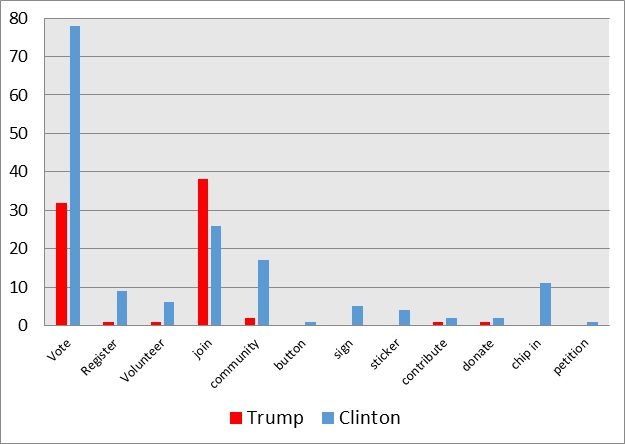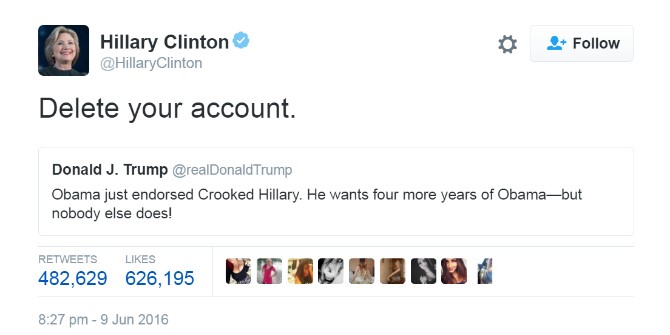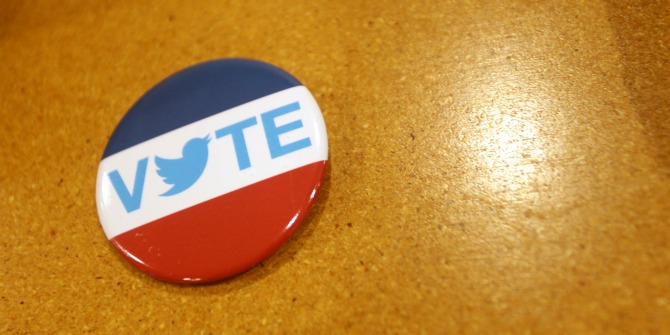

 In a presidential election as close as the current one, the result may be heavily influenced by how each party can mobilize its supporters to register and to vote. As part of their ongoing analysis of how the candidates communicate on Twitter, Heather Evans, Kayla Brown, and Tiffany Wimberly have collected and coded tweets concerning mobilization and civic engagement. They find that Hillary Clinton has out-tweeted Donald Trump in almost all words and phrases concerning civic engagement. The only civic engagement category where Trump is winning is when he talks about “joining”; asking people to join him at rallies.
In a presidential election as close as the current one, the result may be heavily influenced by how each party can mobilize its supporters to register and to vote. As part of their ongoing analysis of how the candidates communicate on Twitter, Heather Evans, Kayla Brown, and Tiffany Wimberly have collected and coded tweets concerning mobilization and civic engagement. They find that Hillary Clinton has out-tweeted Donald Trump in almost all words and phrases concerning civic engagement. The only civic engagement category where Trump is winning is when he talks about “joining”; asking people to join him at rallies.
As we get closer to the November 8 election, one common question students ask me is whether Hillary Clinton or Donald Trump spend more time on Twitter talking about voter mobilization and civic engagement. This is an interesting and timely question, given that more people are Googling “voter registration” during this election than before, and recent poll results show that states are traditional partisan strongholds, like Texas, may be competitive in the upcoming election.
I’ve written two book chapters (here and here) on this topic over the past four years, but have examined only congressional races. I previously found that Democrats in both the House and Senate were significantly more likely to discuss civic engagement activities on Twitter in 2012 and 2014. What about this presidential election?
Now that we have collected tweets from both candidates from the beginning of June through the end August, we can code that data for calls to mobilization and engagement.
As I have argued before, it is difficult to pin down a definition of “civic engagement.” The Center for Information and Research on Civic Engagement (CIRCLE) has developed indicators for identifying forms of civic engagement, and divides the activities into three types (civic, electoral, and political):
Table 1 – CIRCLE’s Civic Engagement Indicators
| Civic | Electoral | Political Voice |
|---|---|---|
| Community problem solving | Voting | Contacting officials |
| Volunteering | Persuading others | Contacting the media |
| Membership in a group | Displaying buttons, signs, stickers | Protesting |
| Fund-raising run/walk/ride | Campaign contributions | Petitioning |
| Volunteering | Boycotting | |
| Buycotting | ||
| Canvassing |
To see whether Hillary Clinton or Donald Trump have been more likely to stress these activities, we performed a combination of hand-coding and a key word search looking for each of the above activities during the past three months of Clinton’s and Trump’s tweets. First, we searched our data for each of the following activities: vote, register, volunteer, join, community, button, sign, sticker, contribute, donate, chip in, and petition (other words were also searched but returned no results, like boycott, boycott, canvass, protest, and encourage). Then we combed through the data by hand to be absolutely sure the tweets mentioned some type of civic behavior (e.g. Trump’s tweets using the word “register” referred to either voter registration or registering to buy tickets to see him in person).
Our results show that Hillary Clinton has out-tweeted Donald Trump about almost all civic engagement key words and phrases. As Figure 1 shows, she has sent over twice as many tweets about voting, registering, volunteering, the “community,” contributing to a political cause or her campaign, signing a petition, and political buttons and stickers, most of which Donald Trump has never mentioned. Donald Trump has only out-tweeted her about one civic engagement category: joining. He regularly tells people where to come and see him speak over the past three months, and most of those tweets begin with the phrase “join me.” A majority of Donald Trump’s civic engagement tweets, therefore, have revolved around getting people to come out to a political rally to see him, while the majority of Hillary Clinton’s tweets have been aimed at encouraging citizens to vote.
Figure 1 – Number of Tweets sent from June – August about Types of Civic Engagement

When we sum these tweets and divide by the total number of tweets sent for both candidates, we find that they are each spending approximately 8.4 percent of their total tweets discussing these activities. That’s not a lot when compared to the House and Senate during the 2014 election, which on average discussed these activities in about 20 percent of the tweets sent during the last two months of their elections. Given that we a little over two months from the end of this presidential election season, we only expect these tweets to increase. At this point, the candidates seem focused on different aspects of community engagement. Like in my previous research, the Democratic candidate is paying more attention to voting and registration.
Featured image credit: Gage Skidmore (Flickr, CC-BY-SA-2.0)
Please read our comments policy before commenting.
Note: This article gives the views of the author, and not the position of USAPP – American Politics and Policy, nor the London School of Economics.
Shortened URL for this post: http://bit.ly/2cbELIN
_________________________________
 Heather Evans – Sam Houston State University
Heather Evans – Sam Houston State University
Heather Evans is an Associate Professor in the Department of Political Science at Sam Houston State University. Her primary research interests are political participation and behavior, public opinion, competitive elections, media and politics, the status of women in the political science discipline, and political psychology.
 Kayla Brown
Kayla Brown
Kayla Brown is a junior majoring in political science at Sam Houston State University.
 Tiffany Wimberly
Tiffany Wimberly
Tiffany Wimberly is a junior majoring in political science at Sam Houston State University.






